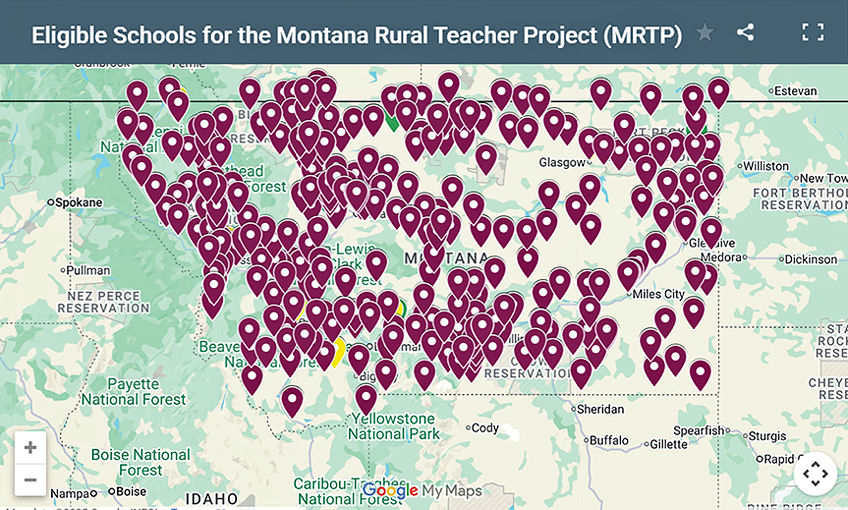
HeartMath® Resilience Advantage Program: Empowering Montana’s Educators
In Spring 2025, Montana’s rural education community embarked on a focused, evidence-based mental wellness pilot. Sparked by Dr. Cindy Fouhy, Ph.D. and in partnership with the HeartMath® Institute, Montana Small Schools Alliance (MSSA), and Montana Professional Learning Collaborative (MtPLC), the initiative aimed to address persistent and unique stressors afflicting teachers in isolated, resource-limited schools. This pilot sought to empower educators through accessible, practical mental health tools during some of the busiest months of the academic year.
The Rural Educator’s Dilemma
Montana is one of the most geographically sparse states in the U.S. Many work in remote areas, as far as 300 miles from larger towns, resulting in both social and professional isolation. Local amenities and engaging activities are scarce, increasing the difficulty of maintaining well-being. Educators often shoulder the emotional weight of their communities, serving as counselors, organizers, and role models with minimal support, intensifying stress and contributing to higher risks of burnout.
The Intervention
Dr. Cindy and her team picked the HeartMath® Resilience Advantage program because it just made sense for Montana’s rural schools. The program involved two 45-minute live virtual sessions led by HeartMath Institute’s Director of Education, Jeff Goelitz, daily independent practice with HeartMath’s Inner Balance™ biofeedback sensors, and weekly reminder e-mails over four to six weeks.
This structure was meant to be both impactful and adaptable, enabling busy, overwhelmed educators to engage without adding to their stress.
First Session: Educators were introduced to the science of heart-rate variability and physiological coherence – learning how the state of the heart can influence resilience, attention, and relational capacity. Teachers were trained to use the Inner Balance app and sensor, which allowed real-time tracking of their physiological coherence and emotional states.
Second Session: Building on the foundation, this meeting emphasized self-regulation, resilience-building, and the development of emotional intelligence. Participants practiced strategies to identify and manage emotional triggers, with an emphasis on actionable techniques applicable in the real-life classroom.
Daily at-home practice with the Inner Balance app, along with weekly follow-up e-mails, helped participants maintain momentum and embed new self-care habits.
High Participation Amid End-of-Year Demands
Despite launching in the Spring when educators typically experience high stress and fatigue, 75% completed both pre- and post-program assessments. Eighteen teachers used the Personal and Organizational Quality Assessment – Revised 4 (POQA-R4), a robust mental health measurement tool from the HeartMath® Research Center. The resulting data would serve to evaluate impact and inform future expansion.
Results and Impact: Key Outcomes
The improvements in educator well-being following this brief intervention were striking, with positive shifts in every major area measured:
| Indicator | % Improvement | Details |
|---|---|---|
| Overall Stress | 37% decrease | Scores dropped from 11.69 to 7.41 (15-pt scale) |
| Emotional Stress | 24% decrease | Anxiety/depression down 25%, anger down 24% |
| Physical Stress | 29% decrease | Significant drop in fatigue and health complaints |
| Emotional Vitality | 18% decrease | Higher emotional buoyancy and contentment |
| Organizational Stress | 21% decrease | Less pressure from work and relationship demands |
| Intention to Quit | 22% decrease | Better retention outlook |
Educators in the program began with stress and vitality scores below the POQA-R4 national adult workforce average, but following participation surpassed national norms on all major indices.
Teacher Reflections and Real-World Impact
Participants throughout rural Montana expressed gratitude for the initiative, even under challenging circumstances. Many teachers maintained daily tracking of their coherence and stress, fostering new habits of self-awareness and regulation. For some, missing a live session did not diminish the perceived value – reporting that the program was "practical," "easy to fit in," and meaningfully improved their ability to manage classroom and life stressors. When teachers regulate their own emotions, it often positively affects their classroom environment and student outcomes.
Moving Forward
The HeartMath Resilience Advantage pilot fostered a culture of self-care among Montana’s rural educators, boosting confidence and advocacy for integrating mental health resources into professional development. Following positive outcomes, partners plan to expand the program and share results with groups like the University of Montana’s Happiness Project, supporting future grants. This pilot shows that short, evidence-based self-care interventions can reduce stress, increase teacher retention, and improve well-being without intensive resources. The initiative demonstrates scalable solutions for enhancing resilience in rural districts, offering hope and a sustainable path to healthier teaching careers across Montana’s communities.


